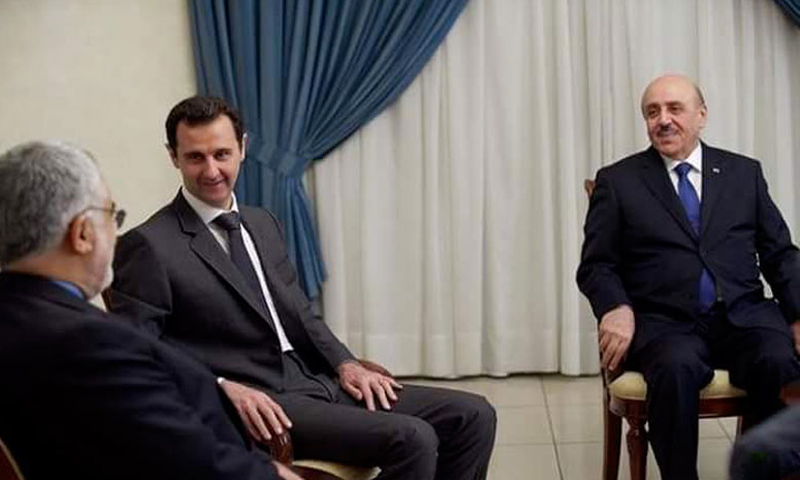



It is known that the Syrian regime refrains from officially announcing the amendments it applies to its security services or military ranks. However, it has recently been making various changes at the level of command of both security branches and bureaus.
Talking about security branches, the changes covered the directors of the principal security services, including the Air Force Intelligence, State Security, the Criminal and Political Security Services.
On Sunday, July 7, 2019, pro-regime pages, Homs News Network among them, reported that the regime has assigned the Major General Ghassan Ismail as the director of the Air Force Intelligence, instead of Jamil Hassan, and the Major General Hussam Louqa to act as the director of the General Directorate of Intelligence.
For his part, the Major General Nasser al-Ali was entrusted the command of the Political Security Department while Nasser Dib, also a Major General, became the head of the Criminal Security Branch, pages on social networking sites reported.
Further amendments were undertaken by the Syrian regime, which covered the Head of the National Security Bureau Major General Ali Mamlouk and the Major General Mohammed Dib Zaitoun, an advisor famed for being close to Bashar al-Assad and the Director of the General Directorate of Intelligence.
On “Facebook,” pro-regime sources have today, Monday, July 8, mentioned that al-Assad has assigned the Major General Ali Mamlouk as his deputy for security-related affairs. The Major General Dib Zaitoun is to replace Mamlouk, becoming the director of the National Security Bureau.
The sources include the middleman of the settlement agreement and the member of the “Reconciliation Committee” in Syria Omar Rahmoun, in addition to pages on social networking sites in the city of Latakia.
It is worth mentioning that these amendments are all a part of a thorough change process that the Syrian regime started yesterday on Sunday, July 7.
Ali Mamlouk was born in Damascus in 1946. He was assigned the director of the State Security Branch prior to becoming the head of the National Security Bureau as a successor of Hisham Bekhtiar, from the Sanjak of Alexandretta, who died in Damascus’ explosion in 2012.
As the former Director of the State Security Branch and the Head of the National Security Bureau, Mamlouk faced economic sanctions which the European Union imposed on him in May 2011, as a result of his involvement in the acts of violence against the anti-regime peaceful protests that broke out in March of the same year.
Under these sanctions, Mamlouk is denied entry to the states of the European Union, while they are prevented from conducting any deals with him.
In the past a few years, Mamlouk’s name became viral for the many discreet trips he made to ally countries and others in Europe. The series of this trips was initiated with a visit to Moscow, while the most famous ones include those to Italy and the Kingdom of Saudi Arabia, which embarrassed the countries of destination, as they are familiar with the sanctions imposed on him and the lawsuits filed against him.
The visit to the Russian capital city, Moscow, in September 2015, was among the first of his tours, which Russian security sources reported to the RIA Novosti Agency. The visit corresponded to the political action and the UN’s efforts to resume the Geneva talks, conducted by the Syrian sides as to resolve the conflict.
In December, Mamlouk also conducted an unannounced visit to Jordan, on which he met Jordanian security officials.
Back then, a number of media outlets, including the Italian Aki Agency, reported that the head of the Syrian National Security Bureau has provided Jordan with a list of the opposition factions that Damascus would want to classify as “terrorist groups” and which the Vienna Conference ordered Jordan to prepare as to manage classifying the Syrian opposition factions.
The London-based al-Hayat Newspaper revealed a meeting which brought together Mamlouk and the back then Saudi Minister of Defense, Mohammad Bin Salman, which addressed a Saudi initiative, calling for conducting “Syrian presidential elections under international supervision.”
On September 7, 2015, Saudi officials received the Major General Mamlouk in Jeddah. The visit was organized through a Russian intermediary, the newspaper reported.
Ali Mamlouk’s geographical spread was not limited to secret and off the record visits, for he also met the Egyptian Head of the National Security Service, the Major General Khaled Fawzy in October 2016. The visit was an answer to the Egyptian side’s invitation, during which both sides agreed to “coordinate the political stance between Syria and Egypt and enhance the coordination in combating the terrorism the two countries are subjected to.”
Born in 1951 in the al-Jobeh, the Qalamun area, Dib was assigned the head of the Political Security Department prior to 2011. After the Central Crisis Management Cell was blown up in September 2012, he became the director of the State Security Department, referred to as the General Directorate of Intelligence as a successor of Ali Mamlouk, who was to act as the director of the National Security Bureau.
According to Pro-Justice, Mohammed Dib Zaitoun has a history of oppression, for he ran the investigations with the Damascus Declaration for Democratic National Change in 2007, which was the turning point. He, then, became close to Bashar al-Assad, ready whenever repression of political issues is needed, especially since the Political Security Department is immediately affiliated with the Syrian presidency.
Zaitoun is on the list of British, European, Canadian and American sanctions, as he shares many crimes against humanity with the Major General Ali Mamlouk. They both tackled several highly sensitive files, especially those relating to forming relations and communication with foreign intelligence services.
Along with Mamlouk, he traveled to many countries, on top of which was Italy in mid-2016, on a private jet. There, they met the official of the Italian Foreign Intelligence Service.
if you think the article contain wrong information or you have additional details Send Correction